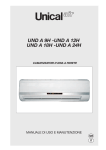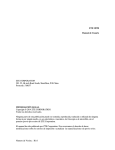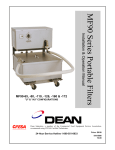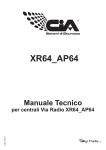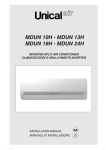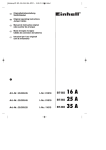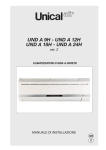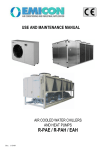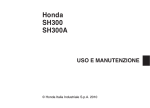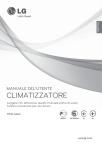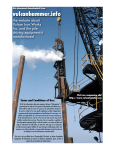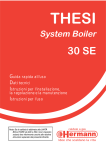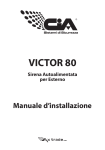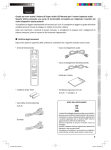Download Scarica l`allegato
Transcript
MDUN 10H - MDUN 13H MDUN 18H - MDUN 24H INVERTER SPLIT AIR CONDITIONER CLIMATIZZATORI D’ARIA A PARETE INVERTER USER MANUAL MANUALE DI USO E MANUTENZIONE Carefully read the warnings and correctly carry out the procedures CAUTION ! Don’t try to install the conditioner alone; always contact specialized personnel. - In case of default or bad working always contact authorized and specialized staff; removing parts or the maintenance of the appliance could expose the user to danger due to electric shock. The conditioner doesn’t have parts whose maintenance can be carried out by the user. -In case of removal contact authorized personnel for the dismounting and the new installation. -Never insert your fingers or various objects in the outlets of the air flow and in the intake grills. There is a fan inside the device that turns at high speed and could cause serious personal injuries. Particular care with children. -Never remain directly exposed to the flow of cold air for a long time. The direct and prolonged exposition to cold air could be dangerous for your health. Particular care should be taken in the rooms where there are children, old or sick people. - In case of bad working of the conditioner (i.e. smell of burnt) immediately stop it, unhook the automatic switch and contact authorized skilled staff. The prolonged use of the device in such conditions could cause fire or electrocution. WARNINGS ! -During the installation of the indoor and outdoor units the access to the working area should be forbidden to children. Unforeseeable accidents could happen. -Never block or cover the intake grill and the outlet grill of the air flow. The obstruction of these openings causes a reduction in the operative efficiency of the conditioner with possible consequent failures or damages. -Never use the conditioner to conserve food, plants, precision devices, works of art. The quality of the conserved objects could be deteriorated. -Never expose animals or plants to the direct air flow. A long direct exposition to the flow of cold air of the conditioner could have negative effects on plants and animals. -Never direct the air flow of the conditioner toward fireplaces or other heating devices. A direct air flow toward the fire could provoke an incorrect combustion and cause fires. -During the use of the device, ventilate the room every now and then. An insufficient ventilation could be the origin of lack of oxygen in the room. -Don’t put the conditioner in contact with water. The electrical insulation could be damaged and thus causing electrocution. -Check the installation conditions to find out possible damages. After a prolonged use ask the specialized staff to control the installation conditions of the conditioner. -Never use inflammable gases near the conditioner. -Always use the appliance with the air filter mounted. The use of the conditioner without air filter could cause an excessive accumulation of dust or waste on the inner parts of the device with possible subsequent failures. -Unhook the automatic switch if you foresee not to use the device for a long time. 3 Wall Air-Conditioner WALL AIR-CONDITIONER The conditioner is made up of two units connected between themselves through copper pipes (properly insulated) and an electrical power cable. The indoor unit is installed on the walls of the room to be conditioned. The outdoor unit is installed on the floor or on the wall on suitable brackets. Technical data of the air conditioner are printed on the tabels placed on the indoor and outdoor units. INDOOR UNIT OUTDOOR UNIT Air intake grill Flap Air intake Air outlet REMOTE CONTROL Air outlet FF /O ON AT HE ING HT LIG ER P EE TIM SL SW O RB W TU O BL + DE MO OL CO N FA DISPLAY HEAT COOL SET. TEMP RUN INDICATOR DRY WINDOW RECEIVER FUNCTION SELECTOR Lift the front panel of the unit to reach the manual control of the conditioner. AUTO: the conditioner is in automatic function; it is possible to switch the conditioner on if the remote control is not working. For the automatic function see paragraph 2.1. Manual switch 4 1 REMOTE CONTROL – PUSHBUTTONS AND MAIN FUNCTIONS The remote control has been designed for an easy and fast use. USE OF THE REMOTE CONTROL 1. Direct the remote control toward the conditioner. 2. Check that there are no objects between the remote control and the receiver on the conditioner. 3. The signal of the remote control can be sent from a max. distance of 10 mt. 4. Never leave the remote control exposed to the rays of the sun ON/OFF It is used to switch the conditioner on and off. When the remote control is on, the message OPER appears on the display. MODE Selection of working mode as to the sequence: (AUTOMATIC WORKING) (COOLING) (DEHUMIDIFICATION) (FAN) (HEATING) + - FAN The two pushbuttons set the wished temperature between 16° C and 30° C. The temperature raises or decreases by pressing + or - respectively. Selection of fan speed as to the sequence: AUTO FAN (automatic) FAN (low) FAN (middle) FAN (high) SWING: activation or deactivation of the movement of the “Flaps”. SLEEP TIMER ON TIMER OFF CLOCK TEMP It activates the function “SLEEP”. This function automatically adjusts the temperature to optimize the climate of the room making it comfortable during the night sleep and thus favouring the saving of energy. Timed start/stop programming. It regulates the clock. Selection of ambient or setting temperature (optional). TURBO Selection of turbo mode. BLOW Selection of blow mode, anti-mould. LIGHT Activation or deactivation of display. N.B.The unit confirms the correct reception of each pushbutton with a beep. 5 2 WORKING MODE The conditioner is designed to create the ideal climatic conditions for the wellbeing of the people in the room. It is able to cool and dehumidify (and heat in the models with heat pump) the air in a completely automatic way. Filter The air sucked by the fan enters from the grill of the front panel and passes through the filter, which keeps the dust. Then it is conveyed between the flaps of a "heat exchanger" and cooled and dehumidified or heated through a flapped coil. The heat removed from the room is drained outside. When the cycle is finished the fan gives back the fresh air in the room; the outlet direction of the air is regulated by the flaps, which are motorized up and down, and by the vertical deflectors (right and left), manually moved. Heat exchanger Fan 2.1 “AUTO” SYSTEM OF AUTOMATIC ADJUSTMENT Press pushbutton MODE to access this mode In the “AUTO” working the electronic control automatically selects the working mode as to the room temperature (taken by the probe which is incorporated in the indoor unit): if the room temperature falls under 20° C, a heating cycle is activated. It remains in function till the temperature doesnʼt rise above 22° C; if the room temperature exceeds 25° C a cooling cycle is activated. It remains in function till the temperature doesnʼt fall under 23° C. · · The “AUTO” mode can be activated also selecting the pushbutton placed inside the front panel of the indoor unit. 1 To optimize the working of the conditioner, adjust the speed (1) (see chapter 2,6) and the direction of the air flow (2) by pressing the pushbuttons indicated in the figure. The device can automatically select the ideal temperature as to the user's desire. 6 2 2.2 COOLING Press the key MODE until the symbol appears on the display, the conditioner cools the room and at the same time reduces the humidity in the air. The cooling cycle is activated by setting the keys “TEMP” + or - at a temperature lower than that of the room. Example: the room temperature is 28° C, if we set the cooling at a temperature lower than 27°, the compressor will immediately start. The device automatically adjusts the working cycles of the compressor keeping the wished temperature in the room. 1 3 2 Example: If the room temperature is higher than 27°C, set a value between 24°C and 27°C on the remote control. Close curtains and windows to protect the room from the sun. To optimize the functioning of the conditioner adjust the temperature (1), the speed (2) (see chapter 2,6) and the direction of the air flow (3) by pressing the keys indicated in the figure. 2.3 DEHUMIDIFICATION MODE Press the key until the symbol appears on the display: a completely automatic function of alternating cooling cycles and air fan is activated. This allows the humidity and the room temperature to be kept constant without relevant variations in temperature (the temperature can also be set by the user. The working is completely automatic and the device adjusts the speed of the fan. This function reduces the humidity of the air to make the room more comfortable. 1 2 To optimize the functioning of the conditioner adjust the temperature (1), the speed (2) by pressing the keys indicated in the figure. The dehumidification “DRY” automatically selects the cooling keeping the temperature set and the room temperature on balance. 7 2.4 FAN MODE Press the key until the symbol , appears on the display, the conditioner works in fan mode only. To optimize the functioning of the conditioner adjust the the speed (1) (see chapter 2,6) and the direction of the air flow (2) by pressing the keys indicated in the figure. 2 1 2.5 HEATING Press the key MODE until the symbol appears on the display, the conditioner heats the room at an economic consumption level thanks to the “heat pump”. With the “HEAT” function the room is heated using the warmth of the external air at a low temperature. With the keys “TEMP” + or – set a temperature higher than the room temperature to start the heating cycle. CAUTION: during the working with the heat pump the conditioner can automatically activate a defrost cycle, which is essential to free the condensing unit from an excessive deposit of frost. Examples: The room temperature is 18° C, if we set the heating at a temperature higher than 19° C, the compressor starts immediately.. When the temperature is lower than 14°C, set a value between 16°C and 20°C on the remote control. Donʼt use the heating mode when the outdoor temperature is lower than - 7°C. · · · To optimize the functioning of the conditioner adjust the temperature (1), the speed (2) (see chapter 2,6) and the direction of the air flow (3) by pressing the keys indicated in the figure. 8 1 2 3 2.6 ADJUSTMENT OF THE FAN SPEED By pressing the key FAN you can chose the wished fan speed among: (HIGH)” when the “COOL” - “HEAT” functions are selected. (MID.) (LOW) “AUTO automatic electronic control of the speed of the fan. The sets the “AUTO” mode T h e temperature is adjusted at an optimal level, in constant reference with the conditions of the room climate. The speed of the fan increases when a greater cooling or heating effect is required. 2.7 “SWING” CONTROL OF THE AIR FLOW · · The air flow in outlet is uniformly distributed in the room. it is possible to position the direction of the air in the optimal solution. ADJUSTMENT OF THE DIRECTION OF THE AIR FLOW activates the “FLAP” and the air flow The key is directed alternatively from up to down and vice-versa, in order to guarantee an even diffusion of the air in the room. · In mode cooling, orient the flaps in horizontal direction; · In mode heating, orient the flaps downward as the warm air always tends to rise upward. The deflectors are positioned manually and placed under the flaps. They allow to direct the air flow rightward or leftward. Caution: never position “Flaps”, manually, the delicate mechanism activating them could be seriously damaged! 2.8 “Flap” movement “Flaps” DANGER! Never insert your hand or objects in the air outlet of the units! These units contains a fan that turns at high speed. “SLEEP” FUNCTION This mode is activated by selecting the key SLEEP . appears on the display. The function The symbol “SLEEP” automatically adjusts the temperature to make the room more comfortable during the night sleep. In cooling or dehumidification mode the set temperature is progressively increased of 2° C during the first two hours of working. In heating mode the set temperature is progressively decreased of 2° C during the first 2 hours of working. 9 2.9 BLOW This mode is activated by selecting the key BLOW In COOLING and DRY function there are still water exit inside the indoor unit when the air conditioner is turned off. With BLOW function, Unical air Conditioners can make its fan continue to work in breeze state for about 10 minutes when it is turned off. Dry water to remain the inside of unit clean and dry. 2.10 TURBO When the TURBO is turned on, the whole units runs at the high fan speed to make the ambient temperature swiftly approach to the setting temperature. Turn off the TURBO, the whole units runs at the setting fan speed. 2.11 LOCK To press + and - button, can lock or unlock the keyboard, after locked, the symbol of the lock will be displayed as this time, to press any key, the symbol will flash for 3 times. After it is unlocked, the symbol will disappear. 10 2.12 TIMER TIMED STOP (fig. 1) TIMER OFF The timed stop is programmed with the appliance on. Pressing TIMER OFF at every selection of the key + or - the Timer goes on of 1 minutes till it reaches the 24 hours. Press the key + or - more times till on the display you can read the time in hours which passes between the programming and the timed stop: press TIMER OFF to confirm! fig. 1 TIMED START (fig. 2) TIMER ON To program the timed start, the appliance should be off Press TIMER ON : every time you press the key + or - the Timer goes on of 1 minute till it reaches the 24 hours. Press the key + or - more times till on the display you can read the time in hours which passes between the programming and the timed start: press TIMER ON to confirm! IMPORTANT Before proceeding with the timed start: MODE program the working mode with the key and FAN the fan speed with the key . · · switch the conditioner off (with the key ON/OFF). fig. 2 The function allows to automatically activate or deactivate the conditioner at the wished time and thus saving a lot of energy. 3 TRICKS TO SAVE ENERGY The use of the Timer is advised whenever you want to program the timed start in order to avoid the · conditioner to work unnecessarily when you are out of the house. program a too high temperature in heating and a too low one in cooling. · Never not to frequently open and close doors and windows; the continuous warmth exchange with the outside · Try hinders the conditioner work. it is better not to install the units in places directly exposed to the sun. · Use · the function "SLEEP" during the night. 11 4 WARNINGS AND IMPORTANT SAFETY INFORMATION Never carry out maintenance which involves opening the machine: it could be dangerous due to the presence of live parts and the gas contained in the refrigerating circuit. Always contact a specialized Technical Service. · Connect the conditioner to a suitable electric line, which should be protected by a thermal-magnetic safety switch suited to the electrical input of the appliance. · Never use the plug to stop the unit. · It is sometimes possible during operation to hear a noise similar to running water; this effect is caused by the refrigerant flowing in the pipes and is quite normal. · When the conditioner starts or stops, particularly in heating, it is possible to hear some creakings caused by the thermsl expansion of the unit parts. 5 MAINTENANCE 5.1 CLEANING THE CONDITIONER Before starting any cleaning disconnect the machine. Remove the front panel of the unit (fig. 1) lifting it till its greatest stroke and then unhooking it from the hinges to make the cleaning easier. Clean the indoor unit using a cloth with lukewarm water (not higher than 40°C) and neutral soap. Never use aggressive solvents or detergents. If the battery of the outdoor unit is clogged, remove the leaves and the waste and then remove the dust with air jet or a bit of water. 5.2 CLEANING OF THE FILTERS FOR WALL AIR CONDITIONER MODELS The cleaning of the filters is essential for a good efficiency of the conditioner. ANTIDUST FILTERS Open the front panel operating on the sides of the front grill in the points indicated by the arrows (Fig. 1) and pull toward you. Remove the filters by delicately extracting them downward (Fig. 2). If the antidust filter is very dirty, it should be cleaned with a vacuum cleaner or even washed with lukewarm water and neutral soap. Before inserting the filter again, it should be completely dry. It is better to dry it in a ventilated place, but far from warmth sources and direct sun exposition. Never start the conditioner without filters. Fig. 1 Fig. 2 ACTIVATED CARBON FILTERS (Optional) The activated carbon filters, situated beneath the air filters (see Fig. 3), absorb odours and smoke from the room and should be changed regularly. 12 Fig. 3 Antidust filter END OF SEASON MAINTENANCE 6 · Disconnect the automatic switch or the plug. · Clean and replace the filters. · On a sunny day let the conditioner work in ventilation for some hours, so that the inside of the unit dry completely. REPLACING THE BATTERIES 7 When: · There is no confirmation beep from the indoor unit. · The liquid crystal display doesn’t _ Size AAA 1,5V + activate. How: · Take off the small lid downward as from the drawing. Place · the new batteries respecting the symbols + and -. N.B. · Use only new batteries. · Remove the batteries from the remote control when the conditioner is not used. OPEN _ 1,5 V + + 1,5 V _ WARNING! Do not throw flat batteries with common rubbish, they should be disposed of in the special containers situated in the collection points. 8 IF THE CONDITIONER DOESN’T WORK 1. If the conditioner doesn’t work, control the voltage of the mains: · Is the plug inserted properly? · Has the automatic circuit-breaker intervened? · Has there been a power failure? Note: if there is a power failure, the conditioner switches off: when the power returns, the air conditioner will restart automatically. 2. If the cooling (or heating) effect seams less than normal: Has the temperature been correctly set on the control Has a door or a window been opened? Is the indoor unit directly exposed to the sunlight? Are the filters clogged? Are there obstacles hindering the free air circulation from the indoor unit or to the outdoor unit? · · · · · Unical garantisce la conformità dei climatizzatori alle norme relative alla sicurezza del prodotto secondo le Direttive Europee. Leggere attentamente le precauzioni ed eseguire correttamente le procedure. ATTENZIONE ! Non tentare di installare da se il climatizzatore; rivolgersi sempre a personale autorizzato. - In caso di guasto o mal funzionamento rivolgersi sempre a personale di servizio autorizzato; qualsiasi tentativo di rimozione di parti, o di manutenzione dell’apparecchio può esporre l’utente al pericolo di scosse elettriche. Il climatizzatore non contiene parti la cui manutenzione può essere effettuata dall’utente. -In caso di trasloco, rivolgersi a personale autorizzato alla rimozione e alla nuova installazione. -Non inserire le dita o oggetti vari nei bocchettoni di uscita del flusso d’aria e nelle griglie di aspirazione. All’interno dell’apparecchio vi è un ventilatore che gira ad alta velocità, che potrebbe causare gravi lesioni personali. Far particolarmente attenzione ai bambini. -Non rimanere direttamente esposti al flusso d’aria fredda per lunghi periodi di tempo. L’esposizione diretta e prolungata all’aria fredda può essere nociva alla salute. Far particolarmente attenzione nelle camere dove vi siano bambini, persone anziane o persone ammalate. - In caso di mal funzionamento del climatizzatore (es. odore di bruciato) arrestare immediatamente il funzionamento dell’apparecchio, sganciare l’interruttore automatico dedicato e rivolgersi a personale di servizio autorizzato. L’uso continuato dell’apparecchio in tali condizioni può essere all’origine di incendi o folgorazioni. AVVERTENZE ! -Durante le operazioni di installazione degli apparecchi interno ed esterno, evitare l’accesso ai bambini sul luogo di lavoro. Possono verificarsi incidenti imprevisti. -Non bloccare o coprire la griglia di aspirazione e di mandata del flusso d’aria. L’ostruzione di tali aperture causa una riduzione dell’efficienza operativa del condizionatore, con conseguenti possibili disfunzioni o danni. -Non usare il climatizzatore in applicazioni quali la conservazione di alimenti, piante, apparecchi di precisione, opere d’arte. La qualità degli oggetti conservati potrebbe subire un deterioramento. -Non esporre animali o piante al diretto flusso d’aria dell’apparecchio. Una lunga esposizione diretta al flusso d’aria fredda del climatizzatore può avere influenze negative su piante ed animali. -Non dirigere il flusso d’aria del climatizzatore verso camini o altri apparecchi di riscaldamento. Un flusso d’aria diretto verso il fuoco può provocare una combustione non corretta e provocare incendi. -Aerare di tanto in tanto la stanza nel corso dell’utilizzo dell’apparecchio. Un areazione insufficiente può essere all’origine di insufficienza di ossigeno nella stanza. -Non esporre il climatizzatore a contatto con l’acqua. L’isolamento elettrico potrebbe subire danni, con conseguenti possibili folgorazioni. -Verificare le condizioni di installazione per individuare eventuali danni. Dopo un uso prolungato, richiedere a personale di servizio specializzato di controllare le condizioni di installazione del climatizzatore. -Non usare gas infiammabili nelle vicinanze del climatizzatore. -Utilizzare sempre l’apparecchio con il filtro per l’aria installato. L’uso del climatizzatore senza filtro dell’aria può causare un eccessivo accumulo di polvere o detriti sulle parti interne dell’apparecchio, con conseguenti possibili disfunzioni. -Sganciare l’interruttore automatico se si prevede di non utilizzare l’apparecchio per lunghi periodi di tempo. 14 Climatizzatore d'aria a parete MODELLO A PARETE Il climatizzatore è costituito da due unità collegate tra loro da tubazioni in rame (isolate adeguatamente) e da un cavo elettrico di alimentazione. L’Unità Interna viene installata su una parete dell’ambiente da climatizzare. L’Unità Esterna viene installata a pavimento o a parete, sulle apposite staffe. I dati tecnici del climatizzatore sono riportati sulle apposite etichette poste sull’unità interna ed esterna. UNITÀ INTERNA Griglia di entrata dell’aria Aletta “Flap” UNITÀ ESTERNA Entrata dell’aria Uscita dell’aria TELECOMANDO FF /O ON Uscita dell’aria AT HE ING P EE HT LIG ER TIM SL SW O RB TU OW BL + DE MO OL CO N FA DISPLAY HEAT COOL SET. TEMP RUN INDICATOR DRY WINDOW RECEIVER SELETTORE DELLE FUNZIONI Sollevare il pannello frontale dell’unità per accedere al comando manuale del climatizzatore. AUTO: il climatizzatore é in funzione automatico; é possibile accendere il climatizzatore nel caso il telecomando non fosse funzionante. La funzione automatico é illustrata dettagliatamente nel paragrafo 2.1. Manual switch 15 1 TELECOMANDO - TASTI E FUNZIONI PRINCIPALI Il telecomando è stato studiato in modo da rendere facile e rapido lʼutilizzo del climatizzatore. UTILIZZO DEL TELECOMANDO 1. Dirigere il telecomando verso il climatizzatore. 2.Verificare che non vi siano oggetti interposti tra il telecomando e il ricevitore posto sul climatizzatore. 3.Il segnale del telecomando può essere trasmesso da una distanza massima di 10 mt. 4.Non lasciare il telecomando in zone direttamente esposte ai raggi solari. ON/OFF Si utilizza per accendere e spegnere il climatizzatore. Quando il telecomando è acceso sul display compare la scritta OPER. MODE Seleziona la modalità di funzionamento secondo la sequenza: (FUNZIONAMENTO AUTOMATICO) (RAFFREDDAMENTO) (DEUMIDIFICAZIONE) (VENTILAZIONE) (RISCALDAMENTO) + I due pulsanti impostano la temperatura desiderata fra 16° C e 30° C. La temperatura aumenta o diminuisce premendo rispettivamente + o - . - FAN Selezione della sequenza: AUTO FAN FAN FAN FAN velocità di ventilazione, secondo la (automatica) (bassa) (media) (alta) SWING: attivazione o disattivazione del movimento delle alette “Flap”. SLEEP Attiva la funzione “SLEEP”. Questa funzione regola automaticamente la temperatura per ottimizzare il clima dellʼambiente, rendendolo confortevole nella fase del sonno notturno e favorendo il risparmio di energia. TIMER ON TIMER OFF Programmazione dell'accensione / spegnimento temporizzata. CLOCK Programmazione dellʼorologio. TEMP Visualizza le temperatura ambiente e impostata (optional). . TURBO Seleziona la modalità TURBO. BLOW Seleziona la modalità BLOW, anti-muffa. LIGHT Illuminazione e spegnimento del Display. N.B. LʼUnità conferma la corretta ricezione di ogni tasto premuto con un bip. 16 2 MODALITÀ DI FUNZIONAMENTO Il climatizzatore è un apparecchio progettato per creare le condizioni climatiche ideali per il benessere delle persone nellʼambiente. Eʼ in grado di raffreddare, deumidificare (e riscaldare nelle versioni pompa di calore) lʼaria in modo totalmente automatico. Filtro Lʼaria, aspirata dal ventilatore, entra dalla griglia del pannello frontale e passa attraverso il filtro, che ne trattiene la polvere; viene quindi convogliata tra le alette di uno “scambiatore di calore” e raffrescata e deumidificata o riscaldata, per mezzo della serpentina alettata. Il calore sottratto allʼambiente viene smaltito allʼesterno. A ciclo ultimato, il ventilatore restituisce lʼaria fresca (o calda in pompa di calore) nellʼambiente; la direzione di uscita dellʼaria viene regolata dalle alette “Flap” motorizzate nel senso verticale e dai deflettori manuali nel senso orizzontale. Scambiatore di calore Ventilatore “AUTO”: SISTEMA DI REGOLAZIONE AUTOMATICO Si accede a questa modalità premendo il tasto MODE : sul display verrà visualizzato il simbolo Nel funzionamento “AUTO” il controllo elettronico seleziona automaticamente la modalità di funzionamento a seconda della temperatura ambiente (rilevata dalla sonda incorporata nellʼUnità Interna): se la temperatura ambiente scende al di sotto di 20° C si avvia il ciclo in riscaldamento, che rimane in funzione finché la temperatura non sale al di sopra dei 22° C; se la temperatura ambiente supera 25° C si avvia il ciclo in raffreddamento, che rimane in funzione finché la temperatura non scende al di sotto dei 23° C. · · La modalità “AUTO” si può attivare anche selezionando il tasto posizionato allʼinterno del pannello frontale dellʼUnità Interna. Per ottimizzare il funzionamento del climatizzatore é opportuno regolare la velocità del ventilatore (1) e la direzione del flusso dellʼaria (2) con la pressione dei tasti segnalati in figura. Lʼapparecchio è in grado di selezionare automaticamente la temperatura ideale a seconda delle condizioni ambientali. 17 11 2 2.2 Premere il tasto RAFFREDDAMENTO MODE finché sul display non compare il simbolo . Il climatizzatore raffresca lʼambiente e contemporaneamente riduce lʼumidità dellʼaria. Il ciclo in raffreddamento viene attivato impostando i tasti “TEMP” + o - ad una temperatura inferiore a quella dellʼambiente. Esempio: supponiamo che la temperatura del locale sia di 28° C, se noi impostiamo il raffreddamento ad una temperatura minore di 27°, questo farà partire immediatamente il compressore. Lʼapparecchio, infatti, regola automaticamente i cicli di funzionamento del compressore, mantenendo la temperatura desiderata nellʼambiente. Esempio: Quando la temperatura ambiente supera i 27°C, impostare sul telecomando un valore compreso tra 24°C e 27°C. Chiudere tende e finestre per riparare dal sole il locale. 1 3 2 Per ottimizzare il funzionamento del climatizzatore é opportuno regolare la temperatura (1), la velocità (2) (vedi paragrafo 2,6) e la direzione del flusso dellʼaria (3) con la pressione dei tasti segnalati in figura. 2.3 Premere il tasto DEUMIDIFICAZIONE MODE finché sul display non compare il simbolo : si attiva una funzione totalmente automatica di alternanza di cicli di raffreddamento e ventilazione dellʼambiente, che consentono di mantenere costante lʼumidità e la temperatura, senza variazioni rilevanti della stessa (questa può anche essere anche impostata dallʼutente). Il funzionamento é completamente automatico: lʼapparecchio regola la velocità del ventilatore. Questa funzione riduce lʼumidità dellʼaria per rendere lʼambiente più confortevole. 1 2 Per ottimizzare il funzionamento del climatizzatore é opportuno regolare la temperatura (1) e la direzione del flusso dellʼaria (2) con la pressione dei tasti segnalati in figura. La deumidificazione “DRY” seleziona automaticamente il raffreddamento, nellʼequilibrio costante tra la temperatura impostata e la temperatura del locale. 18 2.4 VENTILAZIONE Premere il tasto compare il simbolo ventilazione. MODE finché sul display non , il climatizzatore funziona in sola Per ottimizzare il funzionamento del climatizzatore é opportuno regolare la velocità (1) (vedi capitolo 2,6) e la direzione del flusso dellʼaria (2) con la pressione dei tasti segnalati in figura. 2 1 2.5 Premere il tasto RISCALDAMENTO MODE finché sul display non compare il simbolo , il climatizzatore riscalda lʼambiente in modo economico, grazie alla funzione “pompa di calore”. In funzionamento “HEAT” il riscaldamento dellʼambiente è prodotto utilizzando il calore dellʼaria esterna a bassa temperatura. Perché si avvii il ciclo in riscaldamento impostare con i tasti “TEMP” + o - una temperatura superiore alla temperatura ambiente. ATTENZIONE: il climatizzatore, durante il funzionamento pompa di calore, può attivare automaticamente un ciclo di sbrinamento, indispensabile per poter liberare lʼunità condensante da un eccessivo deposito di brina. Esempi: Supponiamo che la temperatura del locale sia 18° C, se noi impostiamo il riscaldamento ad una temperatura superiore di 19° C, questo farà partire immediatamente il compressore. Quando la temperatura è minore di 14°C, impostare sul telecomando un valore compreso tra 16°C e 20°C. Non utilizzare la modalità riscaldamento quando la temperatura esterna è inferiore a - 7°C. · · · Per ottimizzare il funzionamento del climatizzatore é opportuno regolare la temperatura (1), la velocità (2) (vedi capitolo 2,6) e la direzione del flusso dellʼaria (3) con la pressione dei tasti segnalati in figura. 19 1 2 3 2.6 REGOLAZIONE DELLA VELOCITÀ DEL VENTILATORE Premendo il tasto FAN è possibile scegliere la velocità desiderata di ventilazione fra: (HIGH)”. (MID.) (LOW) “ AU T O il controllo elettronico automatico della velocità del ventilatoimposta t à “ AU T O ” La modalire. La temperatura viene regolata ad un livello ottimale, in costante riferimento alle condizioni del clima dellʼambiente. La velocità del ventilatore aumenta nelle condizioni in cui si renda necessario un maggior effetto di raffreddamento o riscaldamento. 2.7 “SWING” CONTROLLO DEL FLUSSO DELLʼARIA · Il flusso dʼaria in uscita viene distribuito uniformemente nellʼambiente. · É possibile selezionare la direzione dellʼaria nella posizione ottimale. REGOLAZIONE DELLA DIREZIONE DEL FLUSSO DELLʼARIA si attivano le alette “FLAP” e il Con il tasto flusso dellʼaria viene direzionato alternativamente dallʼalto verso il basso e viceversa; in modo da garantire la diffusione uniforme dellʼaria nellʼambiente. · in modalità raffreddamento è consigliabile orientare le alette nel senso orizzontale; · in modalità riscaldamento è consigliabile orientare le alette verso il basso, dato che lʼaria calda tende sempre a salire verso lʼalto. I deflettori vengono posizionati manualmente. Sono collocati al di sotto delle alette “Flap” e consentono di dirigere il flusso dellʼaria verso destra o verso sinistra. Movimento “Flap” Alette “Flap” PERICOLO! Non inserire mai mani o oggetti di alcun genere nellʼuscita dʼaria delle unità ! Queste unità contengono un ventilatore che gira ad alta velocità. Attenzione: non posizionare mai manualmente le alette “Flap”, il delicato meccanismo che le aziona potrebbe venire seriamente danneggiato! 2.8 FUNZIONE “SLEEP” Questa modalità si attiva selezionando il tasto SLEEP . la funzione Sul display compare il simbolo “SLEEP” regola automaticamente la temperatura rendendo lʼambiente più confortevole nella fase del sonno notturno,disattivando il display dll'unita' interna. In modalità raffreddamento o deumidificazione la temperatura impostata viene aumentata progressivamente di 2° C durante le prime due ore di funzionamento. In modalità riscaldamento la temperatura impostata viene diminuita progressivamente di 2° C durante le prime 2 ore di funzionamento. 20 2.9 BLOW Questa modalità si attiva premendo il tasto BLOW Nel funzionamento COOL (raffrescamento) e DRY (deumidificazione) avviene la creazione di condensa nello scambiatore interno: se viene attivata la funzione BLOW, quando il climatizzatore viene spento il ventilatore interno continua a ruotare per asciugare lo scambiatore, eliminando le goccioline residue di condensa, altrimenti causa di formazione di muffe e batteri. Il ventilatore verrà disattivato automaticamente dopo circa 10 minuti. 2.10 TURBO Questa modalità permette al climatizzatore di raggiungere più rapidamente la temepratura desiderata in ambiente; il ventilatore dell'unità interna ruoterà alla massima velocità. Disattivando la funzione TURBO, il ventilatore tornerà a girare alla velocità selezionata. 2.11 BLOCCO TASTI Premendo il tasto + e - contemporaneamente è possibile bloccare i tasti del telecomando. Sul display apparirà l'icona Ripremere i tasti + e - per riabilitare la tastiera. 21 2.12 TIMER SPEGNIMENTO TEMPORIZZATO (fig. 1) OFF Lo spegnimento temporizzato si programma ad apparecchio acceso. Premendo TIMER OFF ogni selezione del tasto + o il Timer avanza di 1 minutofino a raggiungere le 24 ore. Premere il tasto + o - più volte fino a leggere sul display il tempo, espresso in ore, che intercorre dal momento della programmazione al momento dello spegnimento temporizzato: ripremere il tasto TIMER OFF per riconfermare il tempo di spegnimento. ACCENSIONE TEMPORIZZATA (fig. 2) ON fig. 1 Per programmare lʼaccensione temporizzata lʼapparecchio deve essere spento. Premere TIMER ON : ad ogni pressione del tasto + o il Timer avanza di (1 minuto) fino a raggiungere le 24 ore. Premere il tasto + o - più volte fino a leggere sul display il tempo, espresso in ore, che intercorre dal momento della programmazione al momento dellʼaccensione tem porizzata: ripremere il tasto TIMER ON per confermare il tempo di accensione. IMPORTANTE Prima di procedere allʼaccensione temporizzata: programmare la modalità di funzionamento · con il tasto MODE e la velocità di ventilazione con il tasto FAN . · spegnere il climatizzatore (con il tasto ON/OFF). fig. 2 La funzione permette di attivare o disattivare automaticamente il climatizzatore allʼorario desiderato, consentendo un notevole risparmio di energia. 3 ACCORGIMENTI AI FINI DEL RISPARMIO ENERGETICO del Timer è consigliato ogni volta che si voglia programmare lʼaccensione temporizzata, al fine di evita·re Lʼuso che il climatizzatore lavori inutilmente quando si è fuori casa. programmare una temperatura troppo elevata (in riscaldamento) o troppo bassa (in raffreddamento). · Non Cercare di non aprire e chiudere frequentemente porte e finestre; il continuo scambio termico con lʼesterno ·ostacola il lavoro del climatizzatore. · É preferibile non installare le unità in punti esposti alla luce diretta del sole. · Usare la funzione “SLEEP” durante il periodo notturno. 22 4 AVVERTENZE ED INFORMAZIONI PER LA SICUREZZA Potrebbe risultare pericoloso qualsiasi tentativo personale di manutenzione che implichi l’apertura della macchina, a causa della presenza di elementi sotto tensione e del refrigerante contenuto nel circuito frigorifero. Contattate sempre un servizio di Assistenza Tecnica specializzato. · Collegare il climatizzatore ad una linea elettrica appositamente dedicata, servita da un interruttore magnetotermico di portata adeguata all’assorbimento dell’apparecchio. · Raccomandiamo di non utilizzare mai la spina per spegnere l’apparecchio. · Durante il funzionamento è possibile udire a volte un rumore simile all’acqua corrente; questo effetto fa parte del normale funzionamento della macchina, causato dal liquido refrigerante che fluisce nelle tubazioni. · Quando il climatizzatore si avvia o si ferma, specie in riscaldamento, è possibile udire degli scricchiolii a causa dell’espansione termica delle parti che compongono l’apparecchio. 5 PICCOLA MANUTENZIONE 5.1 PULIZIA DEL CLIMATIZZATORE Prima di qualsiasi operazione di pulizia staccare la spina o disinserire l’interruttore automatico. Per facilitare le operazioni di pulizia é possibile staccare il pannello frontale dell’unità (fig.1) sollevandolo fino alla sua massima corsa sganciandolo poi dalle cerniere. Pulire l’Unità Interna usando un panno inumidito con acqua tiepida (non più di 40°C) e sapone neutro. Non usare solventi o detergenti aggressivi. Se la batteria dell’Unità Esterna è intasata: togliere le foglie e i detriti e poi eliminare la polvere con un getto d’aria o un po’ d’acqua. 5.2 PULIZIA DEI FILTRI PER MODELLI A PARETE La pulizia dei filtri è una condizione essenziale per un buon rendimento del climatizzatore. FILTRI ANTIPOLVERE Aprire il pannello frontale agendo sui lati della griglia frontale nei punti indicati dalle frecce (Fig. 1) e tirare verso di sè. Estrarre i filtri sfilandoli delicatamente verso il basso (Fig. 2). Il filtro antipolvere deve essere pulito con un’aspirapolvere o anche lavato con acqua tiepida e sapone neutro, se molto sporco. Prima del reinserimento, controllare che il filtro sia perfettamente asciutto; è preferibile asciugarlo in un luogo ventilato, ma lontano da fonti di calore e dai raggi diretti del sole. Il climatizzatore non deve mai essere messo in funzione senza i filtri. Fig. 1 Fig. 2 Filtro antipolvere FILTRI A CARBONI ATTIVI (Optional) I filtri a carboni attivi, posizionati sotto i filtri dell’aria, (vedi Fig. 3) assorbono i fumi e gli odori dell’ambiente; per una corretta manutenzione si raccomanda di sostituirli periodicamente. 23 Fig. 3 MANUTENZIONE DI FINE STAGIONE 6 · Staccare la spina o disinserire l’interruttore automatico. · Pulire i filtri e rimontarli. · In una giornata di sole far funzionare il climatizzatore in ventilazione per alcune ore, in modo che l’interno possa asciugarsi completamente. SOSTITUZIONE DELLE BATTERIE 7 Quando: Come: · Dall’Unità Interna non si riceve alcun bip di conferma. · Il display a cristalli liquidi non si attiva. · Sfilare verso il basso il coperchietto come da disegno. · Sistemare le nuove batterie rispettando i simboli + e -. N.B. _ Size AAA 1,5V + OPEN · Utilizzare solamente batterie nuove. · Se non si usa il climatizzatore togliere le batterie dal telecomando. IMPORTANTE: non gettare le batterie scariche tra i rifiuti comuni, é opportuno smaltirle negli appositi contenitori posti nei punti di raccolta. 8 _ 1,5 V + + 1,5 V _ SE IL CLIMATIZZATORE NON FUNZIONA 1. Se l’apparecchio non dà segno di vita, controllare che vi sia la tensione di rete: · la spina è ben inserita? · l’interruttore automatico é inserito? · c’è stata un’interruzione dell’alimentazione? Nota: con una caduta di tensione il climatizzatore si spegne: al ritorno della tensione esso si riavvia automaticamente. 2. Se l’effetto di raffreddamento (o di riscaldamento) sembra inferiore al normale : la temperatura è stata impostata correttamente sul comando? è stata aperta una porta o una finestra? l’Unità Interna è esposta ai raggi diretti del sole? i filtri sono intasati? vi sono ostacoli che impediscono la libera circolazione dell’aria all’Unità Interna o alla Unità Esterna? · · · · · Unical garantisce la conformità dei climatizzatori alle norme relative alla sicurezza del prodotto secondo le Direttive Europee.

























